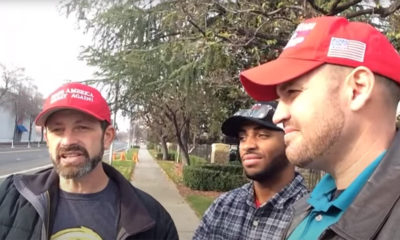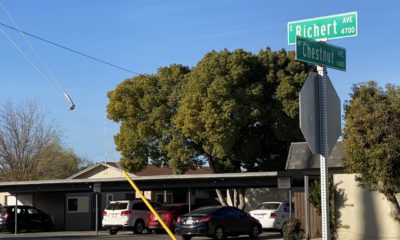Published
7 years agoon

Recycling in Fresno parking lots will continue — despite an attempt to regulate the centers out of existence.
A Fresno County Superior Court judge has invalidated a city ordinance that would limit, if not outright close, numerous recyclers operating in the city.
“We are pleased with the court’s ruling to rescind the ordinance that would have led to the closure of Fresno’s parking lot recyclers,” said Aaron Moreno, the CGA’s Senior Director of Government Relations. “It will save grocers and other retailers from having to choose between paying $36,500 per year or taking garbage back in the store as a result of there being no recycling center available.
David Taub has spent most of his career in journalism behind the scenes working as a TV assignment editor and radio producer. For more than a decade, he has worked in the Fresno market with such stops at KSEE-24, KMJ and Power Talk 96.7. Taub also worked the production and support side of some of TV sports biggest events including the Super Bowl, the NBA Finals and NASCAR to name a few. Taub graduated from the University of Michigan with dual degrees in communications and political science. You can contact David at 559-492-4037 or at Send an Email



From Valley Farms to the Capitol: Ramirez Is Key Part of Biden’s Team


Conservative Trio Return to Arias’ Home. He Wasn’t There.


Dictos Wants to End Stain of Fresno’s Discriminatory Housing Covenants


Fresno’s George Whitmore, Legendary Climber of El Capitan and Conservationist, Dies at 89


OPINION: Measure P Failed – and Supreme Court Must Uphold This Fact. If Not, Hold On to Your Wallets.


They Made Fresno’s News in 2020. Who Is No. 1?




Leonard Lang
May 13, 2018 at 8:12 am
The Decision Summary
On April 30 superior court judge Jane Cardoza rendered a decision against the city of Fresno and in favor of CGA
On August 2, 2017, the Fresno Planning Commission consider the proposed zoning amendment brought forth by the city. The Commission voted unanimously to reject the city’s proposed amendment.
On September 21, 2017, the Fresno City Council voted on zoning amendments, but with major revisions. Instead of all recyclers being forced out of the city, 16 supermarket type recyclers would be forced to close. This was confirmed by Councilman Paul Caprioglio, an attorney in private practice. Council passed the ordinance unanimously. They did this in violation of city law. Once the proposed ordinance was rewritten, it was required to repeat the planning process.
On October 4, 2017, the city issued a notice of exemption under CEQA Guidelines claiming exemption to the law.
On October 12 the ordinance passed its second vote unanimously and the mayor signed it into law on October 18. This reckless and illegal behavior prompted to lawsuits.
On November 7 the CA Grocers Association filed suit to block the implementation of the ordinance. This was followed by a second lawsuit filed by the affected recyclers.
In the Judge’s discussion of the issues, she found the City conducted no environmental review before approving the amended ordinance and thus judicially abused its discretion. The City bears the burden of producing substantial evidence to support their conclusion. Just claiming that they were exempt is not enough.
The City arrogantly professed that the Grocers were using CEQA for their own personal financial benefit and that they were acting to protect the health, safety and welfare of the public. The City ignored community input to enact their own agenda. Close as many recyclers as possible, force grocers to do something that they didn’t want to do and that would be costly. Mr. Caprioglio offered his unsupported opinion that taking recyclables inside the stores was not likely to be a problem for the stores. I also believe that they had a hidden agenda. The tremendous volume of containers that would be forced to go to the few remaining recycling centers and into grocery stores would be so burdensome that they hoped the public would simply give up their rights as well as the need for the money and donate to the curbside program. Council testimony bears this out.
The standards of review required the court to determine whether there was a prejudicial abuse of discretion, whether they had not acted in a manner required by law and whether or not their actions were supported by substantial evidence. At issue was the use of improper procedure and a dispute over the facts. The city professed that it was exempt from CEQA which requires their decisions to be made with environmental considerations.
The judge cited “An agency abuses its discretion if there is no basis in the record for its determination that the project was exempt from CEQA.”
“The agency must itself provide the support for its decision before the burden shifts to the challenger.” The opponents of the project raised arguments regarding possible significant environmental impacts.
“The city has failed to show that the common sense exemption applied to the amended ordinance.” In fact, the City cited the reason for finding that the common sense exemption applies relies on speculation, conclusions, and generalities rather than any substantial evidence or analysis. Councilman Caprioglio admitted to a significant number of closures.
The judge deduced that the inability of residents to recycle might otherwise result in containers being landfilled or becoming letter or residents being forced to recycle outside the city resulting in the possibility of significant environmental impact.
The Judge recognized that in-store redemption would be refused because of health and safety issues as well as imposing a time-consuming burden and inconvenience of accepting containers would cause. Not to mention that the state refuses to reimburse the stores for this mandated effort increasing its cost to them. Smaller stores could be devastated and forced out of business as a result. The judge believed that this could result in urban decay and urban blight.
According to the judge, “the city appears to be merely speculating that the use of the blue bins would make up for the loss of the CRV recycling centers.”
The Decision
The City abused its discretion in determining that the common sense exemption applied to the ordinance. As a result, the court hereby grants the petition and orders the City to rescind its amended ordinance and conduct further proceedings in compliance with CEQA.
Conclusion. If the City received this information in comments, then why did it proceed in violation of the law? Why did it violate its own procedures to bring this to a vote in Council? And why did it choose to waste the public’s money to defend the decision? This does not represent good stewardship of public funds and violates the public’s trust.
Thank you GVWire for your important work.